Franklin Square (Bloomington, Illinois)
Franklin Square, or Franklin Park is located in Bloomington, Illinois, McLean County. Listed on the National Register of Historic Places, Franklin Square contains the homes of former Vice President Adlai Stevenson I and former Governor Joseph W. Fifer. In 1979 the square was designated as a local historic district.[2] Located northeast of downtown Bloomington, the square encompasses the 300 and 400 blocks of E. Chestnut and E. Walnut streets and the 900 block of N. Prairie and N. McLean streets.[1]
Franklin Square | |
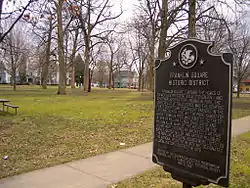 Franklin Park, the heart of the historic district. | |
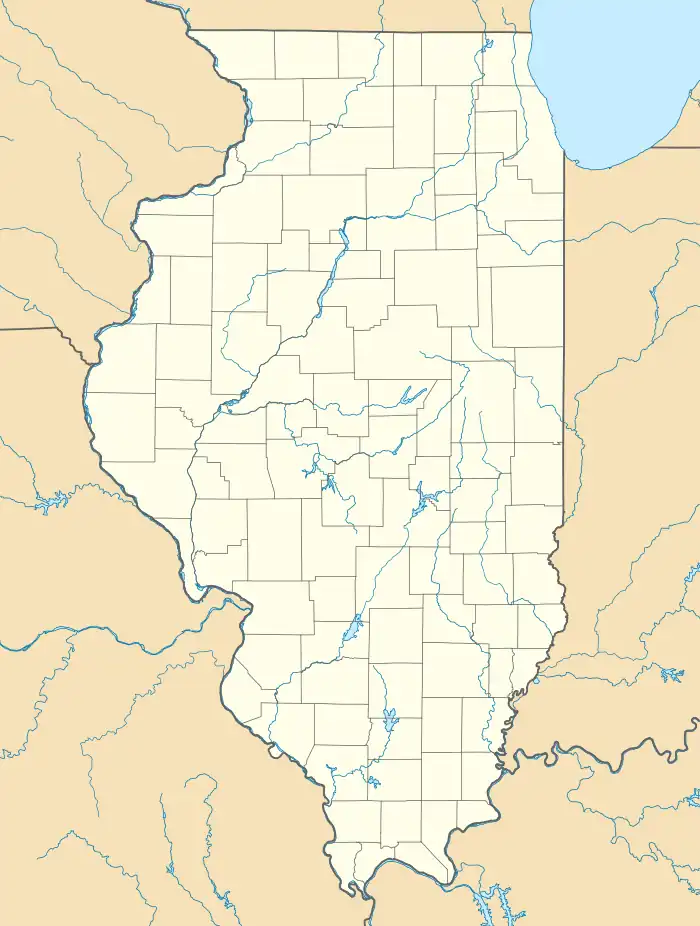 | |
| Location | 300 and 400 blocks of E. Chestnut and E. Walnut Streets, 900 block of N. Prairie and N. McLean Streets, Bloomington, Illinois |
|---|---|
| Coordinates | 40°29′10″N 88°59′24″W |
| Area | 26 acres (11 ha) |
| Architectural style | Queen Anne Victorian, Georgian Revival, Romanesque Revival, Italianate |
| NRHP reference No. | 76002164[1] |
| Added to NRHP | January 11, 1976 |
History

On April 26, 1856, David Davis, William F. Flagg, and William H. Allin donated a 590-by-330-foot parcel of land to the city of Bloomington, asking that the park be “...used as a place of public resort, pastime and recreation, for citizens and strangers forever.” The original agreement called for the city to improve and ornament the park, and prohibited the city from erecting any buildings on the square.[3]
In 1869, a monument was erected in the center of Franklin Square to commemorate the 700 McLean County citizens who died in the Civil War.[4] Commissioned to Haldeman Marble Works of Bloomington, Illinois, for $15,000, the monument stood 49 feet high with a Lemont limestone base. An inscription read, “McLean County’s Honored Sons: Fallen—but not Forgotten” with engravings of the names of the 700 soldiers that died in service. The structure featured four statues of soldiers (Infantry, Cavalry, Zouave, and Marine) and a life-size figure of a colonel atop an 18-foot shaft.[5]
Over the next few years, the monument began to disintegrate. A committee organized to resolve the situation stated, “Unfortunately, the material of which the monument was constructed has proved to be so perishable that the names of the county’s heroes have been nearly obliterated and the entire monument is in danger of falling.”[6] Former Governor Joseph Fifer lobbied for the city to tear down the monument and build a new one in Miller Park in Bloomington. The lower half of the monument was saved and is currently located in the Bloomington neighborhood of Briarwood.[4]
Houses
The houses of Franklin Square were built in a variety of architectural styles from the mid 19th century through the early 20th century, including Georgian Revival, Italianate, Colonial, Queen Anne, and Romanesque Revival.[7] Because the square was home to many prominent citizens of Bloomington, the neighborhood received visits from notable figures, among them Theodore Roosevelt, Ulysses S. Grant, Clarence Darrow, and Carl Sandburg.[8] Today many Illinois Wesleyan University students reside in the square's houses, including the Alpha Lamba chapter of Phi Mu Alpha Sinfonia and the Sigma Alpha chapter of Sigma Alpha Iota.[9]
- Burr House This house was built for Luman Burr at 210 E. Chestnut in 1864 by the Hayes & Evans Contracting Company.[10] It was constructed in the Italianate style and a Queen Anne style; gabled roof, left wing, and back wing were added in the early 20th century.[7] It now operates as a bed and breakfast.[11]
- Dodson-Stevenson House - This 1869 home was built at 903 N. McLean St. in the Italianate style for William K. Dodson. The home's second owner was Adlai E. Stevenson I who became vice president under the administration of Grover Cleveland.[11]
- Fifer-Bohrer House - This Georgian Revival style home was built in 1895 at 909 N. McLean St. and included Queen Anne style elements. The house was home to former Illinois Governor Joseph W. Fifer and his daughter Florence Fifer Bohrer, who was the first female senator from Illinois.[11]
- McClure House Marion Lee McClure, a farmer, landowner, and land speculator commissioned architect George Miller to build a Romanesque style house in 1906 that resembled one he saw in Chicago. The house is known as "The Castle" and features a third-floor ballroom.[12]
- Lillard House This house at 302 Walnut St. was built in 1882 in the Victorian-era Queen Anne style. The first owner of the home, John T. Lillard, was a prominent attorney in Bloomington, Illinois, and married Sarah Davis, daughter of Judge David Davis.[7]
Gallery
 Arts and Crafts style
Arts and Crafts style McClure House
McClure House Burr House
Burr House Phi Mu Alpha Sinfonia chapter house
Phi Mu Alpha Sinfonia chapter house Rho Sigma Alpha sorority house
Rho Sigma Alpha sorority house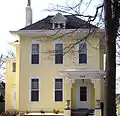 Italianate style
Italianate style Italianate style house built by local architect Arthur Moratz
Italianate style house built by local architect Arthur Moratz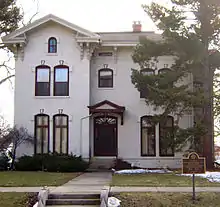 Former home of Adlai Stevenson I
Former home of Adlai Stevenson I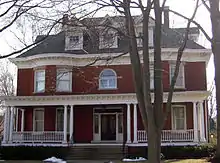 Fifer-Bohrer house
Fifer-Bohrer house Colonial style
Colonial style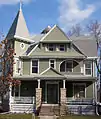 Lillard House
Lillard House
References
- "National Register Information System". National Register of Historic Places. National Park Service. July 9, 2010.
- Kemp, Bill (March 26, 2013). "Franklin 'Square' Bloomington's first park". Pantagraph. Bloomington, IL. Retrieved March 26, 2013.
- "Franklin Square". Pantagraph. Bloomington, IL. June 26, 1857. p. 3.
- Steinbacher-Kemp, Bill (May 27, 2007). "Monument honored county's Civil War dead". Pantagraph. Bloomington, IL. pp. B4.
- Holland’s Bloomington City Directory for 1870-1871. Chicago: Western Publishing Company. 1870–1871. pp. 14–15.
- "Franklin Park Monument to Come Down". Pantagraph. Bloomington, IL. 1914.
- Safiran, Edward T.; Walitschek, David A. (May 1985), Documentary Search and Architectural Survey of Franklin Square and East Jefferson Street Historic Districts, Bloomington, IL: McLean County Museum of History
- Driver, Lolita (February 20, 1972). "Park's political side". Pantagraph. Bloomington, IL. pp. C-3.
- Driver, Lolita (February 6, 1972). "'Greeks' have street for it". Pantagraph. Bloomington, IL. pp. C-3.
- Driver, Lolita (January 23, 1972). "Hudson Burr home built in 1864". Pantagraph. Bloomington, IL. pp. C-5.
- Franklin Square Historic District, Bloomington Historic Preservation Commission, City of Bloomington.
- Driver, Lolita (January 30, 1972). "Castle on the Square". Pantagraph. Bloomington, IL. pp. C-1.